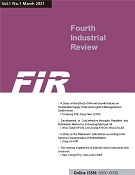- 권한신청
- E-ISSN2765-7213
- KCI Candidate
Organizational Effectiveness of Korean Information and Communication Industry Employees : Focus on Organization Culture, Job Satisfaction, Organizational Commitment and Turnover Intention
Organizational Effectiveness of Korean Information and Communication Industry Employees: Focus on Organization Culture, Job Satisfaction, Organizational Commitment and Turnover Intention
Abstract
Purpose- The purpose of this study is to give implications on how to decrease employee turnover intention of Korean information and communication industry employees using organization culture, job satisfaction and organizational commitment. To do that this study analyzes relationships among variables and analyses mediating effect of job satisfaction and organizational commitment. Research design, data, and methodology- To analyze relationships among organization culture, job satisfaction, organizational commitment and turnover intention of employees, this study used the 7th KRIVET's HCCP employee data especially employees working in the information and communication industry who has more than university degree education. The analysis is conducted by using SPSS 21 and frequency analysis correlation analysis, regression analysis and mediating effect are analyzed by using MACRO PROCESS procedure for SPSS. Result- According to the empirical results, organization culture of innovation, relation and rational directed significantly affect both job satisfaction and organizational commitment. And job satisfaction and organizational commitment significantly affect each other. Turnover intention is significantly affected by job satisfaction, organizational commitment, innovation directed and hierarchy directed. However, the influence of innovation and hierarchy showed conflicting results. Conclusion- Based on this study result, implications to manage the turnover intention of Korean employees in the information and communication industry are discussed. Especially, the effect of organization culture, job satisfaction and organizational commitment is discussed. And the mediating role of job satisfaction and organizational commitment is also analyzed. Result implicates that cautious approach is needed in managing organization culture to employee attitude of job and organization is needed
- keywords
- Organization Culture, Job Satisfaction, Organizational Commitment, Turnover Intention
- 다운로드 수
- 조회수
- 0KCI 피인용수
- 0WOS 피인용수














